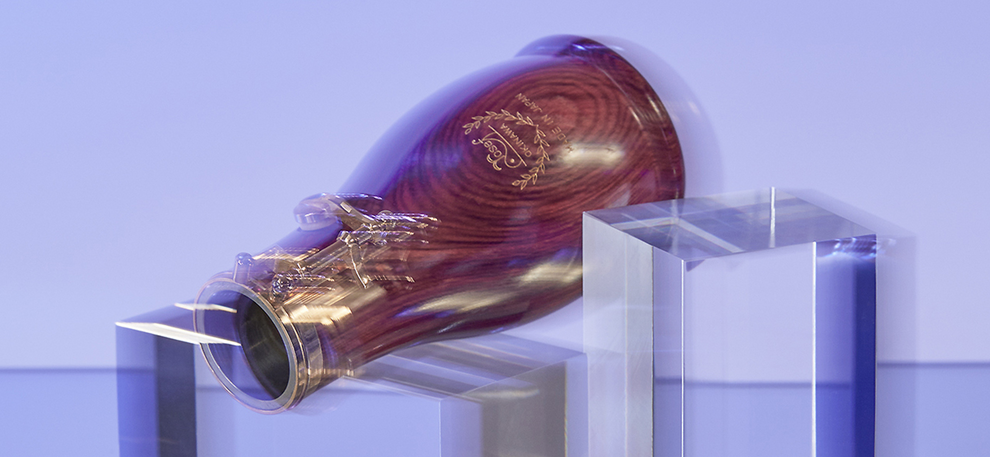So 21.09.2025, 11.00 Uhr | Elbphilharmonie, Kleiner Saal
1. Kammerkonzert
Gustav Holst: Sextett e-Moll
Edvard Grieg: Andante con moto c-Moll EG 116 für Violine, Violoncello und Klavier
Samuel Coleridge-Taylor: Nonett in f-Moll op. 2
Oboe: Guilherme Filipe Sousa
Klarinette: Patrick Hollich
Fagott: José Silva
Horn: Jan Polle
Violine: Daniel Cho
Viola: Iris Icellioglu
Violoncello: Clara Grünwald
Kontrabass: Felix von Werder
Klavier: Camille Lemonnier
Guilherme Filipe Sousa
OboeGuilherme Filipe Costa e Sousa wurde in Coimbra (Portugal) geboren. Seinen Bachelor of Music im Hauptfach Oboe schloss er bei Ricardo Lopes in der Escola de Música e Artes do Espectáculo in Porto ab. Anschließend absolvierte er den Master of Music bei Diethelm Jonas an der Musikhochschule Lübeck. Sowohl als Solist wie auch im kammermusikalischen Bereich hat Guilherme Sousa diverse Wettbewerbe gewonnen, u. a. jeweils den 1. Preis beim Musikwettbewerb des Portugiesischen Rundfunks RTP „Prémio Jovens Músicos” in den Kategorien „Solo“ und „Kammermusik“, den 1. Preis beim „Concurso Nacional de Instrumentos de Sopro de Terras de La-Sallete“, den 2. Preis beim 51. Possehl Musikpreis sowie den 3. Preis beim „5th Józef Ciepłucha International Oboe Competition” im polnischen Łódź. In Portugal wurde er zum Nachwuchsmusiker des Jahres 2013 ernannt. Von 2015 bis 2017 war er Mitglied der Orchesterakademie des Symphonieorchesters des Bayerischen Rundfunks, wo er bei Konzerten im In- und Ausland unter der Leitung von Dirigenten wie Mariss Jansons, Yannick Nézet-Séguin, Kent Nagano und Sir John Elliot Gardiner mitwirkte. 2017 wurde Guilherme Sousa als stellvertretender Solo-Oboist bei den Duisburger Philharmonikern engagiert. Anschließend übernahm er die Stelle als Solo-Oboist der Düsseldorfer Symphoniker an der Deutschen Oper am Rhein und war dort von 2017 bis 2020 als festes Mitglied tätig. Seit 2020 spielt er als Solo-Oboist beim Philharmonischen Staatsorchester Hamburg.
Patrick Hollich
KlarinettePatrick Hollich erlernte das Klarinettenspiel bei Prof. Anton Hollich, studierte anschließend an der Musikhochschule Stuttgart und schloss seinen Master an der Universität der Künste Berlin ab. Er gewann erste Bundespreise bei „Jugend musiziert”, ist mehrfacher Preisträger renommierter Wettbewerbe, u.a. des internationalen Lions-ClubWettbewerbes, des 49. Internationalen Instrumentalwettbewerbes Markneukirchen und des Felix-Mendelssohn-Bartholdy-Wettbewerbs Berlin. Von 2014 bis 2015 war er Akademist der Karajan-Stiftung bei den Berliner Philharmonikern und seit 2015 ist er stellvertretender Solo-Klarinettist des Philharmonischen Staatsorchesters Hamburg.
Jan Polle
HornJan Polle wurde 1997 in Limburg geboren. Seinen ersten Hornunterricht erhielt er im Alter von acht Jahren an der Limburger Musikschule. Von Oktober 2012 bis September 2015 war er Jungstudent an der Hochschule für Musik und Darstellende Kunst Frankfurt am Main bei Esa Tapani. Dort begann er 2015 auch sein Bachelorstudium. Jan Polle war mehrfacher Preisträger des Wettbewerbes Jugend Musiziert, u. a. Bundespreisträger im Jahr 2012. Er absolvierte Meisterkurse bei Johannes Hinterholzer, beim Blechbläserensemble German Brass und mit dem Ensemble Modern („epoche_f“). Von 2018 bis 2020 war Jan Polle Akademist im Staatsorchester Kassel. Weitere professionelle Orchestererfahrungen sammelte er u. a. als Aushilfe am Solo-Horn beim Niedersächsischen Staatsorchester Hannover. Seit 2020 gehört Jan Polle zum Philharmonischen Staatsorchester Hamburg und ist seit 2022 stellvertretender Solo-Hornist.
Daniel Cho
ViolineDaniel Cho wurde in New Jersey (USA) geboren und begann im Alter von sechs Jahren in Südkorea Violine zu spielen. Er schloss sein Bachelorstudium an der Juilliard School in der Klasse von Hyo Kang und David Chan ab und setzte anschließend sein Studium bei Kolja Blacher an der Hochschule für Musik Hanns Eisler Berlin fort. Er gewann zahlreiche internationale Wettbewerbe, darunter den Max-Rostal-Wettbewerb 2019, bei dem er den höchsten Preis erhielt. Als Solist spielte er mit Orchestern wie der Hamburger Camerata, dem Bucheon Philharmonic Orchestra und den Sejong Soloists. 2010 gab er sein Debüt im Weill-Saal der New Yorker Carnegie Hall, präsentiert von der Korea Music Foundation; 2013 folgte sein europäisches Debüt im Musée du Louvre in Paris im Rahmen der „Concerts du Jeudi“. Daniel Cho ist Mitglied der Sejong Soloists und arbeitete eng mit Künstlern wie Gil Shaham, Cho-Liang Lin und Vadim Repin zusammen. Als Konzertmeister spielte er mit dem Juilliard Orchestra, dem Verbier Festival Orchestra und dem Budapest Festival Orchestra. Seit der Spielzeit 2021/22 ist er 1. Konzertmeister des Philharmonischen Staatsorchesters Hamburg.
Iris Icellioglu
ViolaDie in Izmir geborene Bratschistin Iris Icellioglu entdeckte ihre Leidenschaft für die Bratsche im Alter von neun Jahren. Sie begann ihr Studium an der Dokuz Eylül Hochschule für Musik in Izmir bei Pinar Dinçer und setzte es bei Prof. Dr. Çetin Aydar und Prof. Hartmut Lindemann fort. 2016 schloss sie ihr Bachelor-Studium mit Auszeichnung ab. Ihr Masterstudium begann sie bei Prof. Roland Glassl und setzte es später bei Prof. Pauline Sachse an der Hochschule für Musik Lübeck fort, wo sie erfolgreich abschloss. Sie hatte die Gelegenheit, an Meisterkursen von bedeutenden Musikern wie Emile Cantor, Ruşen Güneş, Ron Ephrat, Máté Szücs und Eberhard Feltz im Bereich der Kammermusik teilzunehmen. Während ihres Studiums in Deutschland wurde sie mit drei verschiedenen Kammermusikgruppen mit dem Yehudi Menuhin Live Music Now-Stipendium ausgezeichnet.
Zwischen 2015 und 2017 war sie festes Mitglied des Karsiyaka Kammerorchesters. Später war sie Teil der Orchesterakademie des Philharmonischen Staatsorchesters Hamburg und trat in Orchestern wie dem Rundfunk-Sinfonieorchester Berlin, den Hamburger Symphonikern und dem NDR Elbphilharmonie Orchester als Gastkünstlerin auf.
Sie ist mit dem akademischen Orchester Dokuz Eylül und dem Karsiyaka Kammerorchester als Solistin aufgetreten. Im Rahmen des 45. Istanbul Festivals gewann sie den Wettbewerb „Festival sucht ihre junge Solist*in“ und trat als Solistin mit dem DESO unter der Leitung von Hakan Şensoy auf.
Seit 2022 ist Icellioglu festes Mitglied des Philharmonischen Staatsorchesters Hamburg. Sie hat mit Dirigenten wie Jonathan Nott, Vasily Petrenko, Alan Gilbert, Kent Nagano, Vladimir Jurowsky und Ádám Fischer zusammengearbeitet und trat als Orchester- und Kammermusikerin in weltberühmten Konzerthallen wie Carnegie Hall, Berliner Philharmonie, Elbphilharmonie, Suntory Hall und Sala São Paulo auf.
Clara Grünwald
VioloncelloClara Grünwald wurde 1990 in München geboren und erhielt im Alter von sechs Jahren ihren ersten Cellounterricht. Von 2009 bis 2015 studierte sie bei Martin Ostertag in Karlsruhe und besuchte Meisterkurse bei Wolfgang Emanuel Schmidt, Wolfgang Boettcher, Guido Schiefen, Thomas Demenga und Morten Zeuthen. Clara Grünwald war Stipendiatin der Heinrich-Hertz-Gesellschaft (2009) und von Yehudi Menuhin „Live Music Now“ (2012). Orchestererfahrung sammelte Clara Grünwald als Aushilfe bei den Münchner Philharmonikern und in der Akademie des Symphonieorchesters des Bayerischen Rundfunks. Seit 2015 ist sie stellvertretende Solo-Cellistin des Philharmonischen Staatsorchesters Hamburg.
Felix von Werder
KontrabassFelix von Werder wurde 1990 geboren, wuchs in Kiel auf und erhielt im Alter von sieben Jahren seinen ersten Kontrabassunterricht. Nach prägenden Jahren im Bundesjugendorchester nahm er direkt nach seinem Abitur 2009 ein Kontrabassstudium in der Klasse von Ekkehard Beringer (NDR Elbphilharmonie Orchester) an der Hochschule für Musik, Theater und Medien Hannover auf. Sein Studium ergänzte er durch die Teilnahme an Meisterkursen u. a. bei Dorin Marc, Esko Laine und Nabil Shehata. Außerdem richtungsweisend war ein einjähriger Studienaufenthalt an der Janáček-Akademie in Brünn (Tschechien) in der Klasse von Miloslav Jelínek. Parallel zu seinem Studium war Felix von Werder Stipendiat der Joseph Joachim Akademie der NDR Radiophilharmonie. Noch während seines letzten Studienjahres erhielt er dort im Anschluss an seine Akademiezeit ein Engagement für die Spielzeit 2017/18, bevor er im Oktober 2018 Mitglied des Philharmonischen Staatsorchesters Hamburg wurde. Aushilfstätigkeiten führen ihn u. a. nach Göttingen und Kiel, an die Staatstheater Hannover und Braunschweig sowie zum Gürzenich-Orchester Köln. Als gefragter und leidenschaftlicher Kammermusiker ist sein künstlerisches Schaffen an der Seite von Musikern wie Avi Avital vor allem durch das Bestreben bestimmt, das Kontrabass-Repertoire um noch unbeachtete Literatur zu erweitern und auch dem breiten Publikum näher zu bringen. Eine solche vermittelnde Funktion erkennt er ebenfalls in der Pädagogik und hat große Freude an der Dozententätigkeit zum Beispiel beim Landesjugendorchester Schleswig-Holstein.
Die Klangwelten der Kammerkonzerte des Philharmonischen Staatsorchesters Hamburg sind so unterschiedlich wie die Charaktere der Musiker:innen, die darin agieren. Die Anforderungen im Orchestergraben sind oft durch die Größendimension und die Vielfalt der Stimmen geprägt. Kammermusik hingegen reduziert diese Dimension auf kleinere Ensembles und ermöglicht eine intime musikalische Interaktion. Wie in einem Dialog treffen verschiedene Meinungen aufeinander, neue Ideen entstehen, entwickeln sich während des Spiels und eröffnen so einen kreativen Raum für spontane Entfaltung.





